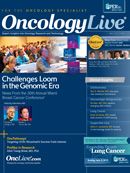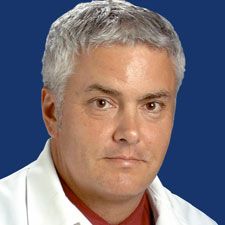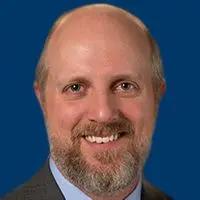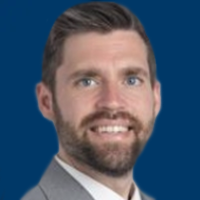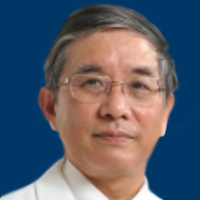Serendipity in Science: NSCLC Specialist Matches Therapies With Targets
An interview with Alice Tsang Shaw, MD, PhD, who has won broad recognition for her contributions to the treatment of NSCLC, including the use of crizotinib to target the ROS1 gene rearrangement and research into other emerging agents.
Photo courtesy of ESMO ©
Dr Shaw discusses crizotinib research during a press briefing at ESMO 2012.
It was her contribution to one of the fastest drug approvals in FDA history that drew Alice Tsang Shaw, MD, PhD, out of the background and into the spotlight.
Shaw was conducting research on mouse models of lung cancer at the Massachusetts Institute of Technology (MIT) in Cambridge when she walked away from the lab and into a key role in the development of the oral tyrosine kinase inhibitor crizotinib for the treatment of non-small cell lung cancer (NSCLC).
As the second targeted therapy for patients with NSCLC, and the first for the subset with a chromosomal rearrangement of the anaplastic lymphoma kinase (ALK) gene, crizotinib represented an important milestone. Further, the drug was approved by the FDA under the trade name Xalkori just five years after it was first tested in patients, making its development swift in comparison to other cancer treatments, according to a 2011 agency report.1
During her time at MIT, Shaw had been aware that researchers at Massachusetts General Hospital (MGH) in Boston were developing crizotinib to target MET in gastrointestinal cancers. But while the drug also targeted the ALK gene, no one knew at the time that ALK proteins played a role in NSCLC. Then, in 2007, Japanese researchers made the “incredible discovery” that ALK was a target in a subset of lung cancer patients, Shaw recalled.
Inspired by the earlier identification of another targetable mutation in NSCLC, Shaw had already decided to leave the lab at MIT, join the staff at MGH, and play a more translational role in bringing novel therapies to patients with the disease. She arrived just in time to help develop crizotinib.
Shaw was on hand when MGH began adding patients with NSCLC to its existing phase I trial of the targeted therapy, and she went on to lead the expansion trial that paved the way for the FDA’s approval of crizotinib in 2011.2 The doctor and her colleagues presented their results at the 2009 Annual Meeting of the American Society of Clinical Oncology (ASCO).
It was clear from the beginning that crizotinib held enormous promise, Shaw recalled.
The first patient enrolled in the trials “was in his 40s, was very, very sick, and had gone through many therapies,” she said. “Because his tumor was positive for ALK, he was started on this therapy, and he had an amazing response. We knew in early 2008 this was going to be a new kind of paradigm in lung cancer.”
Shaw described the breakthrough as an example of “serendipity in science and medicine,” and the same might be said of her decision to switch her focus from benchside to translational research.
Focusing on Targeted Therapies
Since she made that change, Shaw has won broad recognition for her contributions to the treatment of NSCLC, including the use of crizotinib to target the ROS1 gene rearrangement and research into other emerging agents.Today, Shaw serves as an attending physician in MGH’s Center for Thoracic Cancers, an assistant professor of Medicine at the affiliated Harvard Medical School, and a clinical investigator at MIT’s David H. Koch Institute for Integrative Cancer Research.
She is running trials of next-generation ALK inhibitors designed to work after patients develop resistance to crizotinib. And, she’s seeking better therapies for the patients whose mutations are not yet treatable with targeted medications, including those whose tumors express mutated KRAS.
“Most of our patients don’t have known targets,” Shaw said. “We need to find more molecular targets and develop effective targeted treatments to help those patients whose only option is standard chemotherapy. There are exciting new targets and trials coming along, so I’m optimistic.”
To pursue those goals, Shaw must give her attention to a variety of tasks.
Based primarily at MGH, she spends about half her time treating patients both in the clinic and hospital, and the other half conducting research.
Her research time, in turn, is split between her leadership of phase I through III clinical trials and “trying to study specific areas from a basic standpoint that we can translate quickly into the clinic.”
While Shaw no longer runs her own lab, she works with collaborators who do. One is Jeffrey A. Engelman, MD, PhD, director of the Center for Thoracic Cancers at MGH, who partners with Shaw on her translational work.
“I help supervise a postdoc in his lab who’s working on the projects,” said Shaw, who also guides other medical oncology fellows. “Jeff is his research mentor and I’m his clinical mentor. It highlights the way this field is evolving, which is that no single person can do everything.”
Shaw also travels two or three times a month to present clinical trial results to other oncologists at conferences.
Taking a New Direction
It’s a typical schedule for a translational researcher, and one Shaw shouldered seamlessly after deciding to move away from her strict focus on conducting basic research.After graduating from Harvard Medical School in 1999 and completing a residency at MGH, Shaw spent five years studying mouse models of lung cancer at MIT. Then along came gefitinib (Iressa), the first targeted therapy for patients with NSCLC, and the identification of EGFR as a driver mutation in the disease. For Shaw, that development illustrated the potential for targeted therapies and prompted her to devote her career to translational research.
“It transformed the way we thought about lung cancers—that you could identify patients ahead of time based on genetics and predict their responsiveness to a targeted therapy. It was incredibly exciting, and suggested that there must be other targets,” Shaw recalled. “I started thinking of transitioning out of the lab, because it was very clear that these types of discoveries and advances don’t just exist in the lab. To make key discoveries, you have to work across disciplines with basic researchers, trialists, and clinicians. I wanted to be part of that and at the same time take care of patients. So I left the lab in 2007 and joined the faculty here at Massachusetts General Hospital.”
Almost immediately after she made that decision, Shaw became involved in the crizotinib research. She noted that two oncologists at MGH, Jeffrey W. Clark, MD, and Eunice L. Kwak, MD, PhD, were already leading a small, phase I dose-escalation trial of crizotinib in gastrointestinal cancers when the ALK link to NSCLC was characterized.
Knowing that crizotinib not only hit that target but was already available and being tested for safety, “pathologists here, led by A. John Iafrate, MD, PhD, started working immediately on developing a diagnostic test to identify ALK in patients with lung cancer,” Shaw recalled. “They did that within just a couple of months of the first discovery. We were then able to identify ALK-positive patients through screening in our clinics, and direct them to the clinical trial that was already up and enrolling.”
In December 2007, Thomas J. Lynch Jr, MD, then chief of Hematology/Oncology at MGH, became the first doctor to enroll an ALK-positive patient in this clinical trial, she said.
A Growing List of “Firsts”
Several ALK-positive lung cancer patients who joined the trial later in 2008 also had excellent responses to crizotinib, and the following year Shaw and her colleagues presented data about the study at ASCO. Shaw went on to lead a phase III study of the drug in the same population, now completed.3 Meanwhile, phase I and II data were filed with the FDA, leading to the drug’s accelerated approval.4Shaw further helped to advance the use of the therapy last year, when she presented the first data ever demonstrating that ROS1 is a validated therapeutic target in lung cancer, and that patients with this rearrangement respond well to crizotinib.5
Based on preclinical data suggesting that crizotinib might target ROS1 activity, Shaw recalled, Iafrate developed an assay in 2010 to screen patients for the rearrangement. Then, Shaw and her colleagues around the world began directing patients with ROS1 mutations to the same phase I trial that was testing crizotinib in ALK patients.
“ROS1 and ALK clearly represent two separate targets, yet both confer very, very good sensitivity to crizotinib,” Shaw said. “We have updated data now on the response of 20 ROS1-positive patients,6 and they’re holding up as expected. While crizotinib is approved for ALK patients, it’s not approved for ROS1 patients yet. We’re hoping that, with some more data, regulatory agencies will extend the label for crizotinib to include ROS1.”
As effective as it is, crizotinib typically stops working after eight to 10 months, and Shaw is helping to develop new therapies for use after lung cancers become resistant to the treatment.
Among the most promising is Novartis’ compound LDK378, “a next-generation ALK inhibitor that is more potent than crizotinib,” Shaw said. “It’s been through phase I, and we’re about to open phase II and III trials. I presented data at ESMO showing that, for patients with the ALK target where crizotinib stopped working, almost all respond to LDK378.”7
The study of resistance to targeted therapies like crizotinib is one of Shaw’s major research areas. In a previous 2011 study led by Shaw’s colleague at MGH, Lecia V. Sequist, MD, it was discovered that cancers with the EGFR mutation could switch type during treatment, altering their responsiveness to therapies.8
The findings are one argument for repeated biopsies of such patients during treatment, Shaw said.
“If any of our patients on targeted therapies show signs of resistance, we always consider rebiopsying the tumor to understand how it became resistant,” she said. “It will be the wave of the future to monitor, step by step, how tumors are evolving at the molecular level, so we can then pick a new therapy most likely to work.”
Alice Tsang Shaw, MD, PhD . . .
- Spends her time off with her husband and two sons, ages 10 and 7. “They’re active little guys, and they keep me busy,” she said of the boys. “The last movie I saw was probably Harry Potter and the Deathly Hallows, and the last book I read was probably part of the “Humphrey” series about a little hamster. My hobbies have morphed with theirs; I try to make all their soccer games, and since I play piano and the kids also play instruments, we can play duets together.”
- As an up-and-coming researcher, had two mentors. Thomas J. Lynch Jr, MD, director of the Yale Cancer Center and a discoverer of the EGFR mutation, was leading Hematology/Oncology at Massachusetts General Hospital when he recruited Shaw in 2007. Her laboratory mentor was Tyler Jacks, PhD, director of the Koch Institute for Integrative Cancer Research at the Massachusetts Institute of Technology.
- In teaching fellows, likes to stress that “the patient always comes first, even for our research. Our first priority is always patient care.”
- Is adamant about the importance of genetic testing in patients with lung cancer. “The National Comprehensive Cancer Network recommends that the testing be done upfront, at least for EGFR and ALK, so you know if a patient should go on a targeted pill or not,” Shaw said. “We don’t want patients to be deprived of a highly effective therapy.”
- Won the American Lung Association’s Excellence in Lung Cancer Research & Medicine Award in 2011, and was given a translational grant by the V Foundation for Cancer Research in 2009. This grant “was important to me because I had just started working in the ALK area and had no funding,” Shaw said. “This award allowed us to do all of our early studies on crizotinib resistance. The V Foundation has been a huge support for us.”
- Is excited about the potential of immunotherapy approaches in lung cancer.
- Says lung cancer funding is unfairly limited due to the “stigma” of the disease’s association with smoking. “For that reason, research for lung cancer is very much underfunded and always has been, and we’d like to see that change,” she said. “Clearly, smoking is a major risk factor, but not the only one, and many, many of my patients are never-smokers.”
Moments of Inspiration
Growing up in Maryland as the daughter of two chemists, Shaw was familiar with the idea of pursuing a career in science, but less so with the field of medicine.
Her interest in becoming a doctor developed at Harvard, during her time as an undergraduate majoring in biochemistry. “As I took courses in science and started working in labs, I began to understand how to merge those seemingly disparate fields,” she recalled.
Shaw went on to simultaneously earn a medical degree and a doctorate in genetics, both at Harvard Medical School. “I was hoping to integrate a career in medicine with a career in research, with the corollary that I could use whatever I was studying in the lab to help patients,” she said.
“The whole field of cancer has changed in the molecular era, and that happened as I was going through college, graduate school, and medical school,” she continued. “Seeing how powerful genetics was when applied to medicine steered me toward a career in oncology.”
Shaw completed a residency at MGH and a joint fellowship at Dana-Farber Cancer Institute and MGH. She started treating patients with lung cancer in 2001.
“Lung cancer is the second most common cancer in both men and women, but it’s at the top of the list in terms of the deadliest of all cancers, and I started seeing that firsthand by seeing how poorly our patients were doing with their responses to chemotherapy,” Shaw said. “It was clear that we needed better therapies for these patients.”
Some years later, Shaw was gratified to see a much more encouraging result in a patient due to advances she was helping to bring to the field. It was an “aha” moment she doubts she’ll ever forget.
The 31-year-old patient, beset by coughing and shortness of breath but not responding to treatment for a potential infection, was diagnosed with advanced lung cancer. Although he was a never-smoker, typical of patients who have EGFR-mutated lung cancer, he was started on erlotinib (Tarceva) and didn’t respond. When his EGFR test came back negative, he was sent to see Shaw.
She tested him for the ALK rearrangement, but he didn’t have that, either.
“I was concerned about the therapy choices he’d have,” Shaw said, “so since Dr Iafrate had just developed a test for ROS1, I requested that they test the patient’s tumor.”
The positive result came just in time. The patient, who was so sick that it wasn’t clear whether he’d live, joined Shaw’s expansion trial of crizotinib on a Wednesday, and by the weekend, his health was already improving. Two years later, he’s working, exercising, and living a normal life, Shaw said.
Looking Ahead
“It was incredible for us, but it’s not an uncommon story now,” the doctor said. “Had that ROS1 discovery not come about then, he probably wouldn’t be with us. It highlights how rapidly this field moves, and how important timing is.”As her career moves forward, Shaw envisions other breakthroughs in the treatment of lung cancer. In addition to investigating new targeted therapies, she sees the need to shape novel treatment strategies overall.
“We need to start treatment not just with a single targeted drug, but with combinations and different schedules, so that we can induce long-range remissions and prevent resistance from even emerging,” she said. “Our longest-term goal for everybody, even if we can’t cure advanced lung cancer, is to have treatments that allow patients to live with their lung cancer as long as possible, making it more of a chronic kind of illness.”
References
- US Food and Drug Administration. FY2011 innovative drug approvals. http://www.fda.gov/AboutFDA/ReportsManualsForms/Reports/ucm276385.htm. Published December 10, 2012. Accessed March 25, 2013.
- Kwak EL, Bang Y-J, Camidge DR, et al. Anaplastic lymphoma kinase inhibition in non—small-cell lung cancer. N Eng J Med. 2010;363(18):1693-1703.
- Shaw AT, Kim DW, Nakagawa K, et al. Phase III randomized study of crizotinib versus pemetrexed or docetaxel chemotherapy in patients with advanced, ALK-positive non-small cell lung cancer NSCLC (PROFILE 1007). Presented at the European Society for Medical Oncology (ESMO) 2012 Congress; September 30-October 2, 2012; Vienna, Austria. Abstract LBA1.
- FDA approval for crizotinib. National Cancer Institute website. http://www.cancer.gov/cancertopics/ druginfo/fda-crizotinib. Published August 29, 1011. Accessed March 22, 2013.
- Shaw AT, Camidge DR, Engelman JA, et al. Clinical activity of crizotinib in advanced non-small cell lung cancer (NSCLC) harboring ROS1 gene rearrangement. J Clin Oncol. 2011;30(suppl; abstr 7508).
- Ou SI, Camidge DR, Engelman J, et al. Clinical activity of crizotinib in patients with advanced non-small cell lung cancer (NSCLC) harboring ROS1 gene rearrangement. Ann Oncol. 2012;23(suppl 9):ix389-ix399.
- Shaw AT, Camidge DR, Felip E, et al. Results of a first-in-human phase I study of the ALK inhibitor LDK378 in advanced solid tumors. Ann Oncol. 2012;23(suppl 9):ix153.
- Sequist LV, Waltman BA, Dias-Santagata D, et al. Genotypic and histological evolution of lung cancers acquiring resistance to EGFR inhibitors. Sci Transl Med. 2011;3(75):75ra26.
